#Team Plasma Schwarz
Text
Some Colress Headcanons!
I saw some posted by @colress-commodore-enterprises and was inspired to write some of my own!
Colress squeaks when he's startled or flustered.
He is the second of three siblings: Lusamine is the eldest, Colress is the middle child, and Darach is the youngest.
Cynthia is his cousin; they get on very well.
Colress has long hair! It's mostly straight, but it does curl a bit at the ends. It falls to around his mid-back, but most people don't know about it because Colress usually ties it into a very low ponytail and stuffs it down the back of his shirt, along with brushing his fringe back.
Contrary to popular belief, his blue loopy is completely natural! Colour AND loop! It's a genetic quirk from his maternal side of the family.
Although absolutely terrible at looking after himself, Colress is absolutely amazing with children.
For whatever reason, Colress seems to trigger an instinctive feeling of safety in children. It's to the point where lost kids will approach him for help rather than the very-visible police officer.
On a particularly memorable occasion, Colress took a nap under the shade of a tree and woke up to being used as a pillow by a bunch of sleepy five-year olds.
Colress has quite the sweet tooth! Although fond of most sweets, his favourites are sherbet lemons.
He has been called a human Delcatty on several occasions. Colress didn’t understand why until Rosa showed him the 'Dex entries for said Pokémon.
He has quite a few scars, some larger than others. They're mostly from his experiments or machine mishaps, but he has a horizontal scar across his throat, courtesy of the Shadow Triad.
He is distressingly good at hiding his problems and/or when he needs help. The most notable instance of this was during his tenure as a scientist for Team Plasma. No one had picked up on the pit of apathy and loathing (directed both inwards and towards Plasma, especially Ghetsis) he had fallen into until Rosa all but kicked down his door and dragged the truth out of him.
He prefers to do the "Forehead Bonk of Love" to show Grimsley affection over kissing. He will, provided he's in the mood for it, but he greatly prefers the Forehead Bonk. Naturally, the Delcatty comparisons increased immensely.
Out of the entirety of Team Plasma, he only got on with (and liked) four of them: Aldith, Barret, Schwarz, and Weiss.
He struck up a delicate bond with Ghetsis' Hydreigon. Said Pokémon is now in his care and is basically a house pet. A very intimidating, very traumatised house pet, but a house pet nonetheless.
To Grimsley’s surprise, despite being abysmal at poker, Colress has a terrifying amount of luck when it comes to games that rely purely on luck. As in, win the roulette five times in a row lucky.
Grimsley jokingly calls him a lucky charm and has managed to coax Colress into joining him as an observer for his poker games in the hopes of his luck rubbing off on him. So far, the evidence is inconclusive.
Colress can't bake to save his life. The only baked good he can make is apple pie, and even then it has a 50-50 chance of going catastrophically wrong.
On the other hand, he is a brilliant cook!
Rosa sees him as a father figure, and he in turn sees her a daughter.
Colress LOVES plants. He's an avid gardener, and an anonymous someone keeps on entering him into gardening competitions. Not that he's complaining TOO much; the winnings provide some nice extra income.
It took a long time for him to stop flinching at the sound of someone walking with a cane.
Although very honest about what he did in Team Plasma, he is incredibly reluctant to reveal his personal experiences working for them. Looker can only assume they weren’t good; that scar along his throat is particularly telling.
Colress is actually a very anxious person; he's just very good at hiding it.
He gets on remarkably well with Looker. They inevitably butt heads over some things, but Colress can easily call the man a friend.
Despite being built like a noodle, Colress is stronger than he looks!
Colress used to babysit Lillie and Gladion for Lusamine, back when they were tiny.
He and Darach get along quite well. It's just that they're both so quiet and introverted that people think they're ignoring each other.
He and Lusamine bicker the most; it's usually friendly ribbing or silly spats, but sometimes things can turn nasty. They still love each other regardless.
Colress hums or quietly sings when he's happy during his work. The Frigate never had the luxury of hearing this.
When he squeaks, Colress can sound remarkably similar to squeaky Pokémon toys. On several occasions, Grimsley and Rosa have had to extract the man from underneath the fluffy excitement of their Houndoom and Arcanine.
He and Schwarz once made an unholy concoction they called "The Insomnia Shot". There's so much caffeine in it that only people with the highest tolerance can drink it, and only out of shot glasses. After being kept awake for four days, crashing, and sleeping for a week, the two vowed to never let its recipe see the light of day again.
I may add more as they occur to me.
They were fun to write, too!
#Colress#Headcanons#Pokemon Rosa#Grimsley#Team Plasma Aldith#Team Plasma Barret#Team Plasma Schwarz#Team Plasma Weiss#falsepretensesshipping#(A little bit anyway it's not the main focus here)#Pokemon Looker#Pokemon Cynthia#Lusamine#Pokemon Darach
55 notes
·
View notes
Note
How would you imagine Team Rainbow Rocket if it were to appear in a post-Journeys movie/special? For me, there wouldn't be any alternate evil team leaders involved. Instead, we'd have Giovanni, Matori, Gozu, Atilla, Hun, Pierce, Dr. Zager, Tabitha, Shelly, Mars, Jupiter, Saturn, Charon, Six Sages (Ghetsis would remain in prison), Aliana, Bryony, Celosia, Mable, Xerosic, Team Flare Admins, Team Rocket, Aqua, Magma, Galactic, Plasma, and Flare grunts, Brodie, Aldith, Schwarz, Weiss, and Barret.
That would be great. But since the Mewtwo movie and Mewtwo Returns special the ones in charge of the anime don't use cannonical Teams as villains :(
Also the new writters doesn't seem to care much about events from the past. They had lots of missed opportunities in Journeys °^°
But, let's imagine it could happen. Possitive thinking ✨
Ash would return to Alola to visit his Alolan family and friends. All happy reunited, then BOOM. An explotion and mysterious grunts invade the Aether Foundation. Chaos y des-con-trooool ♫ ooh ♪
(muy pocos van a leer esto así que puedo escribir cualquier locura que se me cante)
Once the invaders flee and everything calms down, they check the damage. They seem to have stolen something... Faba looks scared and nervous but pretends everything is alright.
Then there is trouble in each of the 4 Alolan islands.
Teams Aqua and Magma (all the same as in the anime) in Akala island. Making plans in Brooklet Hill and the Volcano.
Team Plasma in Ula-Ula wanting to freeze the island.
Team Galactic in the almost empty Poni island.
Team Flare in Melemele. Maybe without Lyssandre because he is dead.
Team Rocket could be in Aether Foundation or the Ultra Space. Giovanni is the one organizing everything and stole blueprints from Faba. The one who tried to recruit but refused to participate.

2 notes
·
View notes
Text
Anonymous asked: It’s so good to have you back posting. You mentioned seeing Wagner’s Ring Cycle at the Bayreuth Festival no less during your five month hiatus from your blog. How was that? I’m one of the lucky few to make a full time living as a musician in a symphony orchestra. I’m a Wagner fan as you are too and so I hope you could settle a question about Wagner. I’m sure you know how picky he was about the demands he made on his audiences. If Gustav Mahler contributed to the origination of the modern concert hall experience then did Richard Wagner really make the noisy audience shut up and be silent during opera performances on stage?
It’s easy to look at any stern looking portrait of Richard Wagner with his mutton chop whiskers and not think yes, this Teutonic cad is a killjoy (even if you can get past the lurid anti-semitism etc). But I fear for some things we do Wagner an injustice. Many bad things usually attributed to him are in reality unfair and even untrue. Things are so easily believed because it reinforces the nasty bad boy image we have of him.

This past summer I did see Wagner’s Ring Cycle in Bayreuth, the shrine of all things Wagnerian. My French partner grumbled we were better off spending and extra week of vacation in Bali rather than waste a week on Wagner. As a strong Wagnerian, this was all sacrilege to my ears of course. But in hindsight I should have known better. Any opera staged at Bayreuth these days should be approached with fear and trembling. In short, I was better off listening to Wagner on my headphones whilst sipping cocktails on a beach in Bali than live through the dross on display at the Bayreuth festival.
Growing up everyone told me, the best place to see Wagner’s Ring is Bayreuth, in the magnificent Festspielhaus that the composer built for that very purpose and opened in 1876. That’s what they used to say in Wagner’s day but not today. These days if you want a traditional production, as paradoxical as that sounds, you stay away.

Bayreuth has for some time now specialised in clever, sometimes too-clever-by-half, productions that place the master’s operas in a new context. But at least they try for coherence, unlike some other venues which have assigned each of the four operas to a different director. But at least they try for coherence, unlike some other venues which have assigned each of the four operas to a different director. Earlier this year Stuttgart went even further by entrusting each of the three acts of Walküre to three different production teams. Madness - and this new production has plenty of it, whether a good or bad thing depends on your attitude. Minor cheers mixed with extensive booing greeted the first opera Rheingold, and a thunderous boo followed the second, Walküre, immediately the curtain closed. Bayreuth is famous for such disapproval. I admit I was ticked off, annoyed, and then finally seething by the end. I wish I had a flame thrower so I could burn the whole stage down.
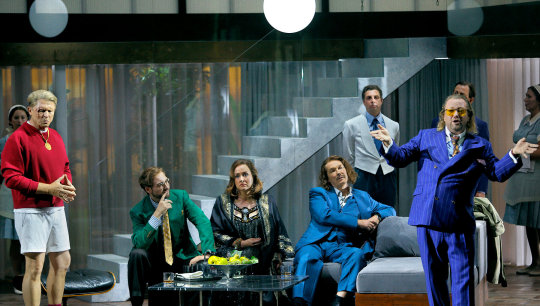
This Ring Cycle was being staged byValentin Schwarz, a 30 something Austrian opera director, and under the musical direction of Cornelius Meister. Schwarz was handpicked by Katharina Wagner. She’s the controversial director running the Bayreuth Festival - not because of talent (she has none) but by virtue of being Richard Wagner’s great-granddaughter (as well as Lizst’s great great granddaughter). In fact Schwarz’s production of the Ring Cycle was actually delayed from 2020 because of the Covid lockdown - so he had all these two years or so to fine tune it and get it right. He did neither and it was a like someone taping your eyelids back and strapping you down before forcing you for nights on end to watch a mind numbing TV soap opera on huge plasma screen.
I knew I was in trouble from the moment I opened the programme notes. My heart sank. Schwarz wasn’t looking to make a coherent Ring Cycle with Wagner’s libretto in a traditional sense, and is instead intended to be “constructively disrespectful”. Such a concept, which includes a deliberately “liberal approach to the plot”, and shifting representations of objects and ideas over the four evenings, is justified by alleged inherent inconsistencies within the work itself.
Oh. Dear God. No.
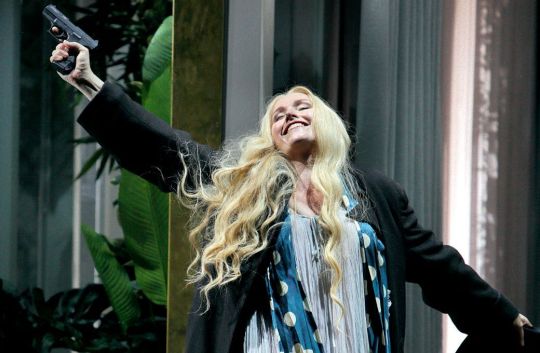
So this chap’s artistic approach was to go for ‘coherent incoherence’ to his overarching message. No, it doesn’t make sense to me either.
I know Wagner traditionalists, and I include myself, are always a hair trigger away from getting our knickers in a twist but when you’re putting on the complete Ring Cycle over four days then we can expect the bare minimum. So there has to be Ring because it’s called the Ring Cycle and preferably gold. And maybe throw in moving funeral march of Siegfried and a heart breaking farewell of Wotan to his daughter Brunnhilde. The bar is quite low. But no, we had none of this. Not even spears or swords and certainly no dragons (as Wagner had intended).
Wagner’s original conception embraces a three-fold division of the world: the Nibelungs beneath the world, the giants on the surface, and the gods in the cloudy heights; all this is made explicit in the third opera Siegfried. But what do we the audience get: a cheap and nasty prime time TV soap opera with studio sets to match. The paddling pool of Rheingold, where the Rhine maidens appear as nannies with children, had become a deep but empty swimming pool. There Hagen kills Siegfried, while his vassals lie half asleep in the fenced-off area above. Brünnhilde, who is supposed to be the tragic but awesome agent of destruction and rebirth, settled herself on the bottom of an empty and dirty swimming pool next to the dead body of her husband Siegfried with the remains of her mutilated horse in a plastic bag.
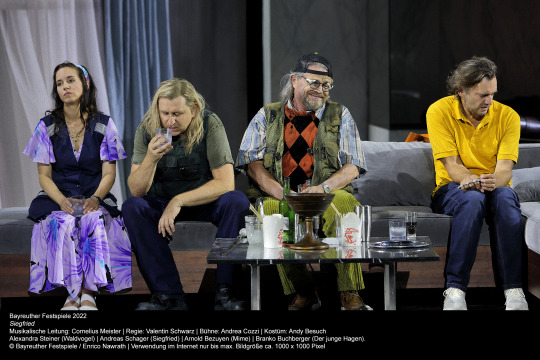
I tried to look past this travesty and honestly digged deep to make sense of what the production was trying to say. The whole staging and the costumes had a TV family soap opera flavour, that was blindingly obvious. But to what end? If there was an overarching theme then perhaps it was to focus on families and how wealth transforms and poisons future generations such as child abuse. The opening E flat chords of Das Rheingold played to a projection of twin foetuses in the womb. At first, they were intertwined peacefully, before one attacked the other, ripping the umbilical cord from its stomach. Moreover, through his programme notes, if not via actions on stage, Schwarz tells us that these warring foetuses are actually brothers of his own creation – Wotan and Alberich. What this sets up is an attempt to place the majority of the work’s characters into one of two branches of the same family – broadly, the have and have-nots – in order to compare their contrasting, or sometimes similar, fortunes, throughout the four evenings.
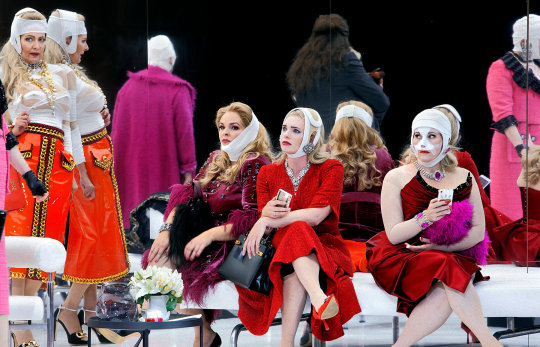
If that was the theme then I not convinced that it worked. Wotan at the start appears as a wheeler-dealer with a mobile phone, willing to be utterly ruthless, as when he shoots his own extra-marital son Siegmund in the second opera. This is Wagner’s Ring as dynastic soap opera but who cares? It’s not going anywhere. Schwarz’s idea, in Rheingold, that the cycle’s foundational sin was the seizure of a child, not of the gold from which a ring of power would be created, was not convincing. In Die Walküre, successfully subverting another big moment to the horror of traditionalists, he placed the final focus of the opera on Fricka’s futile triumph over Wotan, not on Wotan’s farewell to his daughter Brünnhilde. cycle ran out of steam in the end because it had no big or unifying idea.
New Ring cycles are springing up as the world’s opera houses get back into their rhythms after the pandemic. It is a competitive market. Among others, there was a well received one in Leipzig in June of this year, a promising one in Zürich, there’s another in Berlin this autumn and two in London in the years to come. Bayreuth remains an extraordinary venue, its ambitious ability to mount a new cycle in a single season is remarkable, and the 150th anniversary Ring, to be mounted there in 2026, will doubtless be a global event. But the festival feels as though it needs a radical rethink if it is to merit the reputation and attention.
My feeling, after mingling and chatting to others present to witness this travesty, is that many of the audience who were there this year may not have the patience to return for the revival of a Ring that went nowhere.
Increasingly I will tell anyone who wants to experience Wagner is to stay away from Bayreuth. Go and see a production anywhere else but Bayreuth that actually honours the spirit of Wagner’s artistic vision and above all respects the operatic lore and the source material.
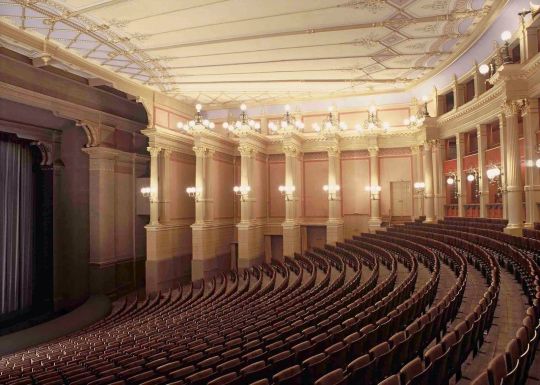
So let’s move on to more pleasant matters. Your question of Wagner and silence in operatic performances.
In effect you're asking about audiences at performances rather than the performers which I think is an interesting question!
Wagner the composer, not the man, was responsible for many things which I think he doesn’t get enough credit for. In effect he revolutionised the operatic stage. Of course one one of his reforms was to dispense with the term "opera," which he replaced with Music Drama. It was at his iconic Festival Playhouse in Bayreuth that he pioneered innovations which we all now take for granted as traditions. It was Wagner who first hid the orchestra in a sunken pit. It was Wagner who insisted on darkening the theatre. And it Wagner who did away with boxes (except for King Ludwig) and instead built in amphitheatrical seating with no aisles. All these innovations were designed as a way to focus all the attention to the stage. The atmosphere of ‘consecration’ striven for at Bayreuth - Parsifal, Wagner's last stage work, was called something like a "Stage-Consecrating Festival Play" (Bühnenweihfestspiel) - meant that talking, moving, etc. were strongly discouraged. Since all the seats were in long rows that spanned the entire auditorium with no aisles, it was basically impossible to leave your seat during an act without making a scandal.
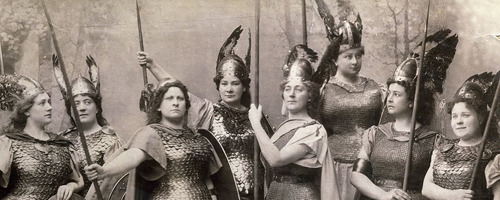
But did Wagner innovate the idea of silence of the audience before an operatic performance? Back in the day, Mark twain found himself writing a letter back home from Beyrouth where he had seen Tannhauser and suggesting the audience was quiet. He wrote, “I saw the last act of "Tannhäuser." I sat in the gloom and the deep stillness, waiting--one minute, two minutes, I do not know exactly how long - then the soft music of the hidden orchestra began to breathe its rich, long sighs out from under the distant stage, and by and by the drop-curtain parted in the middle and was drawn softly aside, disclosing the twilighted wood and a wayside shrine, with a white-robed girl praying and a man standing near. Presently that noble chorus of men's voices was heard approaching, and from that moment until the closing of the curtain it was music, just music--music to make one drunk with pleasure, music to make one take scrip and staff and beg his way round the globe to hear it.”
An audience at Bayreuth hasn’t always been known to be silent especially when they witness what they see as sacrilege on stage and they vent to make their feelings known with boos and cat calls. The story is similar in Milan at the equally famed La Scala too. In Italy to boo and catcall at the opera is positively a national past time. At La Scala opera singers were (and still are) at the mercy of a small group of Milanese musical purists - known as loggionisti, because of their fondness for the cheap seats (loggione) - if their performance was not up to scratch. It’s perfectly normal to interrupt the performance several times with noisy catcalls, and then round off the evening by booing loudly during the curtain call. How charming.

But did Wagner definitely usher in the silent audience for an operatic performance? It’s hard to say. We need to step back a little.
When the first public opera houses were founded in the mid-17th century, they were designed more as venues for social interaction than as sites of pure and sacrosanct aesthetic experience. Fanning out from the stage in glittering tiers were the boxes. Owned or leased by aristocrats or wealthy bourgeois, these intimate little spaces were perfect for entertaining guests, exchanging gossip or simply being seen. Down below was the parterre. Usually left open and generally without seating, this was the preserve of lower-income groups, including soldiers, students and servants, who used the space to meet friends, share a drink and gamble. Accordingly, the music was treated with noisy indifference, at best, or vocal contempt, at worst. Audiences were more interested in their own conversations than with what was happening on stage. They might perhaps listen to an aria, or watch the ballet (if there was one), but no more; and, if they did not like what they heard, they would make their displeasure known.
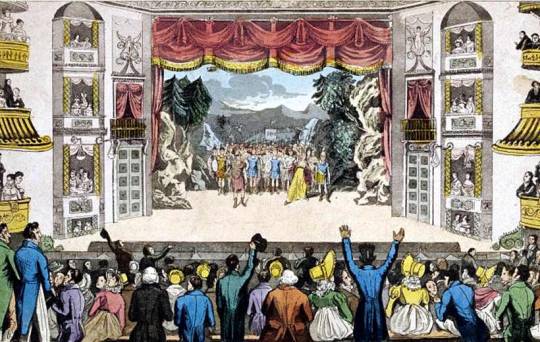
By the 18th century – when many theatres installed seats in the parterre and converted the top tiers of boxes into open loggione - the unruliness of performances had already become a commonplace of literature. In Les Liaisons dangereuses (1782), for example, Pierre Choderlos de Laclos indicated that well-bred patrons thought it quite acceptable to chat throughout a performance. In a letter to Sophie Carnay, Laclos’ ‘heroine’ Cécile de Volanges relates that she had been invited to the Marquise de Merteuil’s box at the Paris Opéra so that they could talk about her forthcoming marriage ‘without any fear of being overheard’. Naturally, such sociability all but smothered the music. After a visit to La Scala in 1770, the English music historian, Charles Burney, complained that the ‘abominable noise and inattention’ of his fellow patrons had made it impossible to make out anything but a few bars during some of the better known arias.
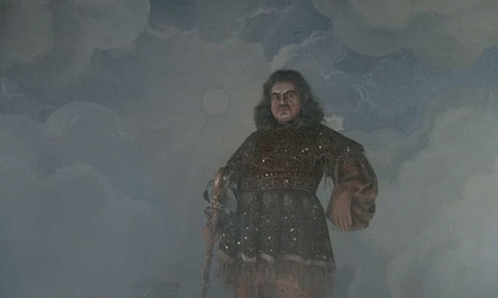
We can assume that British opera-goers were more reverent than their Italian counterparts. Samuel Sharp, a Brit visiting Naples in 1765, wrote in horror that at the San Carlo opera house “the crowd laughed and talked through the whole performance, without any restraint; and, it may be imagined, that an assembly of so many hundreds conversing together so loudly, must entirely cover the voices of the singers.” 85 years later, Mary Shelley expressed similar frustrations in Milan: “Unfortunately, as is well known, the theatre of La Scala serves, not only as the universal drawing-room for all the society of Milan, but every sort of trading transaction, from horse-dealing to stock-jobbing, is carried on in the pit; so that brief and far between are the snatches of melody one can catch.” In fact, for a while, La Scala was the only place the Milanese were allowed to gamble.
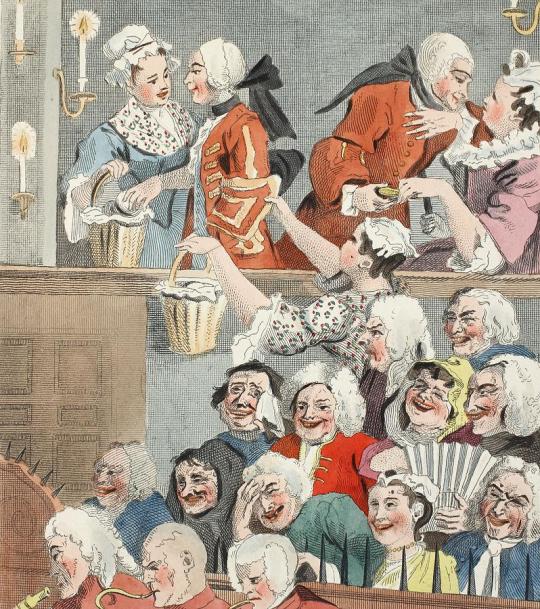
But this was entirely understandable. Imagine you’re an upper-class citizen in 18th or 19th-century Italy. You go to the opera regardless of what is playing, simply because that is where you will encounter the rest of society. You might attend in hopes of catching the eye of an attractive young lady or gentleman. Or maybe you want to talk politics - you can do that during the performance, too. Disappointed in a singer? Mention it to everyone else in your box. Hungry or thirsty? Flag down a seller of drinks or oranges. Buy and eat them - no need to wait for an intermission. Mid-eighteenth-century composers intentionally gave a less important singer the first aria in act two. This was known as the “sorbet aria”: it was traditional to serve sorbet at that time, and the clinking of the spoons made the music difficult to hear.) If the opera truly bores you, you can always pay a visit to friends in another box or head to the gambling tables.
Angered by the lack of respect for their music, some composers attempted to fight back – even writing works satirising their audiences’ bad manners. The anonymous Critique des Hamburgischen Schauplatzes (1725), for example, offered a comical defence of opera against the frequent interruptions of German loggionisti. But it was a losing battle. Realising that no audience would listen to an entire work, composers started to produce pieces that took account of their inattention. These often included an aria di sorbetto (‘sherbet aria’), an incidental passage that allowed the audience to buy food or drink without fear of missing anything important.
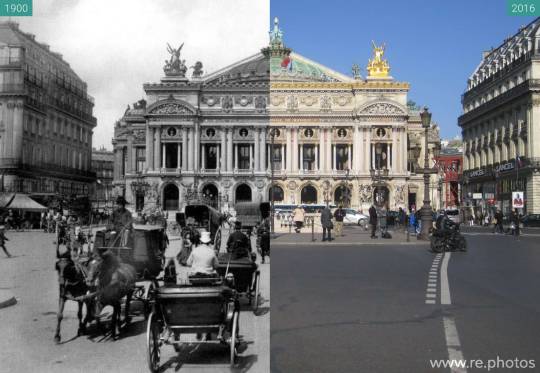
Such concessions only encouraged further raucousness. By the early 19th century, it was almost out of control. In Paris, the situation was particularly bad. In the 1830s, Honoré de Balzac admitted that no one went to the Opéra for the music; while in Stendhal’s Le rouge et le noir (1830) Julien Sorel quickly learns to disregard the performance in favour of his own intrigues. But in Milan, it was even worse. In 1840, Mary Shelley wrote: ‘The theatre of La Scala serves not only as the universal drawing-room for all the society of Milan, but every sort of trading transaction, from horse-dealing to stock-jobbing, is carried on in the pit; so that brief and far between are the snatches of melody that one can hear.’
This kind of control the audience had even influenced what performance happened onstage as well. We still see the occasional encore of a famous aria by a star singer, but in past centuries the audience could and did demand multiple encores of many pieces (little wonder, given how difficult it must have been to hear them the first time around!). In Vienna in 1786, Le nozze di Figaro was received five encores its first night and seven its second (prompting an emperor-imposed ban on encores at future performances, to keep the opera to a reasonable length). Verdi’s Otello had a particularly successful premiere in Milan, with even interludes encored and 20 curtain calls!

Not until the late 19th century did the composers and music directors gain the upper hand and in turn imposed silence as the norm for watching audiences. Even then, it took longer to reach some countries than others. An amusing illustration of the difference between Britain and Italy can be found in E.M. Forster’s novel Where Angels Fear to Tread (1905). Hoping to talk their widowed sister-in-law out of marrying an Italian, the interfering siblings, Philip and Harriet Kingcroft, rush off to the Tuscan town of Monteriano. Soon after arriving, Philip spots a poster announcing a performance of Donizetti’s Lucia di Lammermoor and tries to persuade the sceptical Harriet to go with him. ‘However bad the performance is to-night’, he warns, ‘it will be alive. Italians don’t love music silently, like the beastly Germans. The audience takes its share – sometimes more.’ And so it turns out. Though Harriet does not care for music, Forster noted, she knows ‘how to listen to it’, and is outraged by the constant shouting and whistling. Not until the mid-20th century would poor Harriet have been able to find an Italian theatre where silence more or less reigned.
Why did audiences change their minds? Part of the reason is undoubtedly the evolution of opera itself. Although composers had previously been willing to accommodate unruly behaviour, the advent of Romanticism persuaded Germans to adopt a more uncompromising approach in their music. Beginning with Louis Spohr – who abhorred the ‘vile noise’ of Italian opera houses – attempts were made to make opera more like the Singspiele (‘sing-plays’) of folk tradition. This entailed grouping arias into longer and more coherent scenes, which could not be interrupted or missed without the narrative thread being lost. The culmination of this trend was Richard Wagner’s notion of the Gesamtkunstwerk (‘total work of art’).
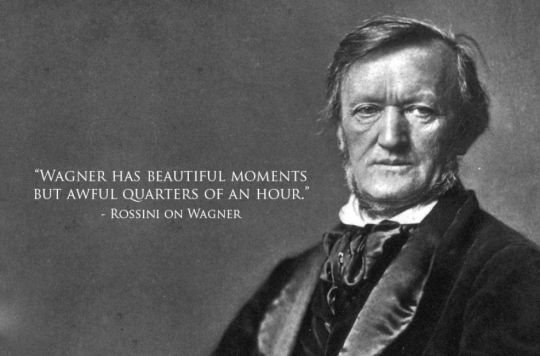
And now we come to Richard Wagner.
Most people blame Wagner for turning on the sound of silence. Because he was in total control at Bayreuth, he went ahead and eliminated audience boxes, hid the orchestral pit, and plunged the audience into darkness. The message was clear: look at the stage, not each other. Pay attention to the music and the action. Let the artists control your experience.
Wagner though didn’t just control his environment that his art demanded (or enforced) but he made demands on the audience for his music in the name of art. Combining music, poetry and drama in epic form, Wagner greatly expanded the role of the orchestra and relied more on the use of leitmotifs - recurrent musical themes associated with a particular character or idea - much beloved of movie soundtracks today, just listen to any John Williams composed films or Howard Shore’s Lord of the Rings - than on structural divisions to advance the story. So great were the demands placed on audiences, that little scope remained for inattention – or interjection. And, as Wagner’s influence spread, so did the silence.
Of course that silence by the audience during performances was also due to social changes and who went to the opera and it’s important to note that. Between about 1650 and 1850, opera was ‘enjoyed’ by a relatively broad range of people. Though public opera houses tended to be financed by monarchs, nobles or wealthy merchants, performances were attended by high and low alike. In the later 19th century, however, the emergence of music halls changed everything. Offering every kind of entertainment - from music to magic - and a deliberately relaxed atmosphere, these quickly won the favour of the working classes and those who didn’t have spare cash to burn. And so opera houses became the preserve of the upper and middle classes.
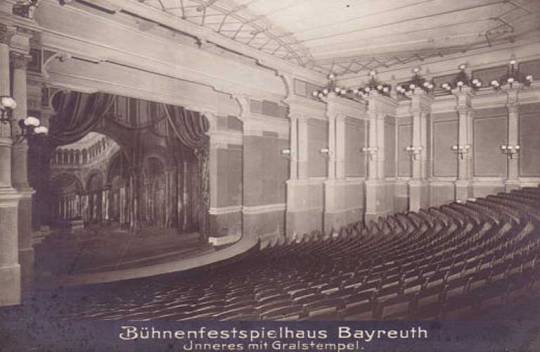
And what happens when the bourgeois and the middle classes capture an art form as an exclusive preserve of their class entitlement? They become snobby about it. They had to socially distance themselves from the great hoi polloi and the crude ways of the working poor. And what better way to virtue signal your civilised class refinement that than to socially enforce a reverential code of sacrilegious silence when watching an opera performance on stage?
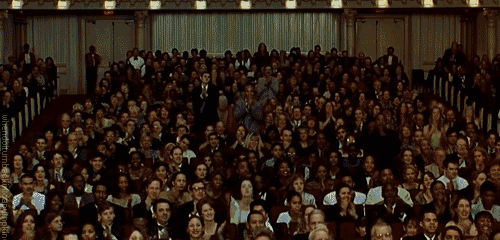
Indeed it’s ironic that Wagner himself who did much to usher in the silence was a victim himself. At Bayreuth performances audiences do not applaud at the end of the first act. This tradition is the result of a misunderstanding arising from Wagner's desire at the premiere to maintain the serious mood of the opera. After much applause following the first and second acts, Wagner spoke to the audience and said that the cast would take no curtain calls until the end of the performance. This confused the audience, who remained silent at the end of the opera until Wagner addressed them again, saying that he did not mean that they could not applaud.
After the performance Wagner complained, "Now I don't know. Did the audience like it or not?"At subsequent performances some believed that Wagner had wanted no applause until the very end, and there was silence after the first two acts. Eventually it became a Bayreuth tradition that no applause would be heard after the first act, but this was certainly not Wagner's idea. In fact, during the first Bayreuth performances, Wagner himself cried "Bravo!" as the Flower maidens made their exit in the second act. But on this occasion when he did this he was severely hissed by some of the audience watching. Wagner was scolded in his own theatre for being a rabble rousing lout. Charming.

All this is to say that this has rather uncomfortable implications. In preferring to listen to an opera in silence, are we really just perpetuating a form of Victorian snobbery? I will leave that for you to think further on.
I confess that I grew up in the Wagnerian tradition, like most opera fans, of respecting an operatic performance as it was happening with silence (even if I wanted to scream abuse at someone on stage as if I was at a football match). I’m no different from anyone else if some idiot is coughing loudly and I give him a look of silent despair or if some poor dear starts chatting to her neighbour then I just get mildly annoyed. I’m there for the opera to lift me out of my body and immerse me into the full drama and music. But even I can understand that such an imposed passivity might make opera inaccessible to everyone (or at least the ones it used to appeal to in the early days). Operas are long - especially Wagner’s operas - and it’s a rare person who can sit through an entire performance hanging on every note with almost religious devotion.

Perhaps the time is long overdue when we need to be so precious with such conventions, if only to broaden the appeal of opera. I’ve been fortunate to have seen operas all across Europe and few exceptional venues overseas too such as the Met in New York. These days if I go to the opera it’s to the Palais Garnier here in Paris. Surprisingly it’s not a stuffy affair as people come dressed as they please and the prices are more affordable, more so than in London. Change in the opera house culture comes at a glacial pace of turning a tanker around, but I feel they are heading in the right direction with their outreach work to appeal to a broader audience.
I’m all for innovation in that regard. Pop up performances in cafés or art galleries or other cool public venues may help people take a second look at opera again…and wrest control away from the stifling hold of the bourgeois. It’s not pure opera but hopefully it helps young people especially to embark on a journey to the opera house.
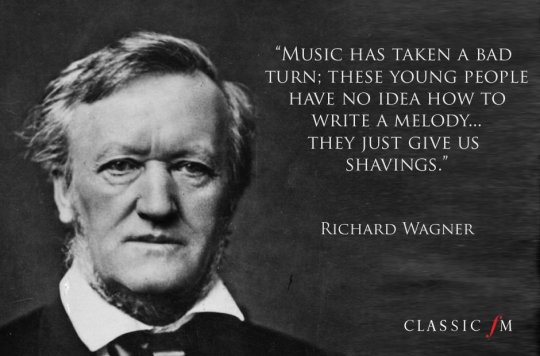
I hope we can have it both ways. I want to hear the music, and I also want the opera house to be a gathering place for all of society and a true diversity of people. I can’t imagine how one does that. Perhaps longer intermissions for food and drink? A beer tent with premium German beer? Or maybe a quiet gambling den area in the lobby area? And perhaps a brothel sponsored bonking boxes for…well, I’ll let your imagination run riot. And it would be keeping with tradition too.
The foyer de la danse in an opera house was a backstage room that essentially served as a brothel for opera and ballet patrons and aficionados in the 19th Century. While other international ballets and operas at the time had similar practices, the 19th century Paris Opera Ballet at the Palais Garnier was perhaps the most notorious and most celebrated by Parisians - how else do you suppose Edgar Degas hang out drawing sketches of nubile ballerinas. The opera house managers were positively pimping out the ballerinas and other artistic performers to keep the wealthy patrons sweet. Not that I’m condoning the legitimacy of courtesans flogging their wares during a performance of La Traviata, although Giuseppe Verdi might smile at the irony given that his celebrated opera was essentially about a Parisienne courtesan, Violetta Valery.
I’m sure the surly and serious minded Richard Wagner would get his mutton chop whiskers in a twist.
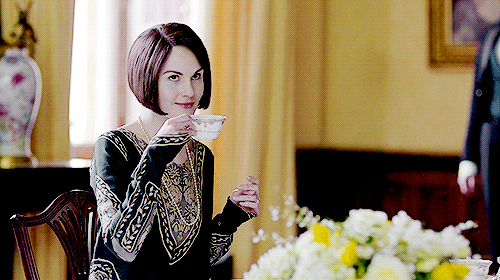
Thanks for your question.
#ask#question#music#opera#richard wagner#composer#wagner#ring cycle#bayreuth festival#bayreuth#german#germany#singing#music drama#paris#palais garnier#audience#history#music history#performance#mahler#verdi#concert#arts#culture#personal
33 notes
·
View notes
Text
Philips cd 610 bedienungsanleitung galaxy
PHILIPS CD 610 BEDIENUNGSANLEITUNG GALAXY >> DOWNLOAD LINK
vk.cc/c7jKeU
PHILIPS CD 610 BEDIENUNGSANLEITUNG GALAXY >> READ ONLINE
bit.do/fSmfG
alcatel audience 12 bedienungsanleitung deutsch
S- BEDIENUNGSANLEITUNG FÜR SAMSUNG SGH-Z105U - EUR 9,49. ZU VERKAUFEN! Aus aktuellem Anlass. Bedienungsanleitung Philips Compact Disc-Spieler CD 610. Sie suchen nach einer Gebrauchsanweisung von TomTom? Sie erhalten bei uns immer die von Ihnen gesuchte TomTom Anleitung. TomTom Go 610 Anleitung. Fax-610. Cobra. PMR 250. 36 dito. Bedienungsanleitung 13568 5 Las Vegas. 2. E-Plus cd 160. 56. E-Plus. DUAL-COM 738. 44. Seite 40 von 299 Anleitung PHILIPS A1PRO/00 OnEar DJ-Kopfhörer Kopfhörer Schwarz 1884986 Player Wiedergabeformate: CD-DA, MP3, WMA Wiedergabemedien: CD, USB Verstärker. Das Handbuch ansehen und herunterladen von Samsung HT-TX35 Heimkino (Seite 1 von 35) (Deutsch). Dieser CD-Player ist ein Laserprodukt der Klasse 1. 79 Angebote zu Philips Dvd Recorder. Günstig kaufen und gratis inserieren auf willhaben - der größte Marktplatz Österreichs.1 Philips GoGear Audio/Video-Player Kurzbedienungsanleitung SA3014 SA3015 2 Connect and Charge 3 Transfer 4 Enjoy CD-ROM Kurzbedienungsanleitung Was Sie Bedienungsanleitung für Samsung Plasma TVs hier schnell und kostenlos herunterladen: Ein Samsung Samsung TV bietet Bedienungsanleitung Samsung PS50B610. Sie erhalten hier die von Ihnen gesuchte Anleitung. Bei Problemen können Sie das Handbuch per E-Mail anfordern. Unser Support-Team hilft Ihnen gern weiter. In
, , , , .
0 notes
Text
Unpopular Opinion Re:Pokemon
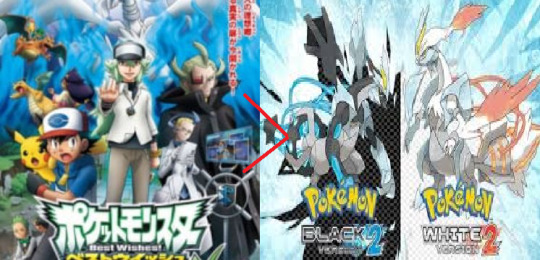
The Episode N arc of Best Wishes is better than the Team Plasma plot of B2/W2.
Now, I do miss stuff like Ex-Plasma, Kyurem, and the Plasma Frigate, and B2/W2′s climax at the Giant Chasm is stronger than Episode N’s climax at the White Ruins which petered out once Reshiram was released from the Light Stone rather than maintaining its momentum.
But otherwise, B2/W2′s Team Plasma plot was weak. The entire first third of it dedicated to stealing Pokemon for experimentation amounted to nothing because the Plasma grunts can’t possibly succeed in their thefts because of the player character’s interference, and even worse we never see or get any feel for Colress’ experiments on behalf of Team Plasma because the game stupidly tried to play him as a last-minute twist villain even though most players could tell right away just by looking at his character design that he was a bad guy. And throughout all of this, we don’t even have any idea why Team Plasma is doing any of it! They’re just being Team Rocket-style villains: criminals who are evil for the sake of being evil.
The second third, kicking off after getting your 6th badge, was made up of plot-crucial info we should have begun learning a long time ago, a pointless battle with Zinzolin in Lacunosa Town, and the big “freezing Opelucid City” event after winning your 7th badge...and while the event is cool (pun intended), the damage done to the city in the game isn’t all that severe, to the point where as the final third begins you’re encouraged to ignore Team Plasma and go get your 8th badge, which you get from a Gym Leader who tries to push BW!Team Plasma’s moral nuance onto B2W2!Team Plasma as if they hadn’t just frozen a whole fucking city! Add to this the overexposure of Zinzolin, underexposure of Ghetsis and Colress, and general lack of action from the grunts outside of on the Plasma Frigate, and it’s severely underwhelming.
In Episode N, we get to see Colress leading Team Plasma right off the bat, and we see Pokemon being stolen and experimented on in order to build toward a grander objective that is made clear through information given fairly early on. Aldith and Barret are good stand-ins for the Shadow Triad, other grunts like Schwarz and Weiss that have distinct designs and personalities, an attack on a city (with a mind-controlled Haxorus and its Hyper Beams rather than a giant ice ray from a flying ship), and no deviating from the action once it gets going (also, no bullshit “are you sure they’re truly evil?” centrism from someone like Marlon here!) The only real downgrade is Ghetsis, who appears far more than he did in B2/W2 but is somehow even more boring than he was there and thus makes even less of an impact.
Episode N is definitely not better that the B/W games’ plot that it derives elements like Reshiram, the Heroes Legend, and N’s character development from, it may not be better than whatever the writers’ original plan for the show’s Myth Arc was (we’ll never know for sure), and it’s also not better than Pokemon Adventures’ version of the B2/W2 plot (or Pokemon Generations’ if it was a fully fleshed-out anime series, for that matter), but when compared to the half-baked Team Plasma storyline of the B2/W2 games, it is the superior experience.
14 notes
·
View notes
Photo

Okay, Twindrake City fand ich immer interessanter, weil diese Stadt versionsabhängig ist und dieser NPC hier quasi die andere Version anspricht. Ich muss mir das nachher mal auf bulbapedia anschauen, aber in Schwarz ist die Stadt moderner und ich weiß gar nicht, ob in Schwarz der selbe NPC DIESE Version anspricht.
Da ist auch ein Typ, der ein PKMN mit Ladevorgang möchte. Alles sehr interessant.
Interessant finde ich auch, dass die NPCs von Team Plasmas/Ghetsis Worten so irritiert sind und hier dann ein oder zwei sind, die dann auf deren Seite sind.
Aber ich find es recht nett, dass die andere Version angesprochen wird. Gen 5 sind die einzigen Spiele, die SOLCHE Unterschiede in den Versionen haben.
0 notes
Text
Little Lost Things - Chapter 6
And Grimsley finally appears!
This one was a bit tough to figure out, but I hope you enjoy it! :)
#My writing#AO3#Fanfic link#Colress#N Harmonia#Grimsley#Team Plasma Schwarz#Pawniard#Please let me know what you think! :)
8 notes
·
View notes
Text
A Funeral of Flowers Chapter 4 - Jasmine Tea and Watching Shadows
Here's chapter 4!
No Colress this time, I'm afraid.
Still, I hope you enjoy it! :)
#Fanfic link#AO3 Link#My Writing#Speaking with Flowers AU#Grimsley#Elite Four Shauntal#Elite Four Marshal#Champion Alder#Team Plasma Aldith#Team Plasma Schwarz#Champion Cynthia#Giratina#Other characters are mentioned#(I really wanted to give Caitlin more time to shine but I unfortunately couldn't fit her in)#N Harmonia#Anthea#Concordia#(They're here too)#falsepretensesshipping
3 notes
·
View notes
Text
Porcelain (Bad End AU 6)
Summary: They are left to pick up the pieces.
This is part of an adaption of the Bad End AU created by @millenianthemums (written with permission) - I highly recommend checking out his work!
#Fanfic link#AO3#Bad End AU#Colress#Team Plasma Aldith#Team Plasma Barret#Team Plasma Schwarz#Team Plasma Weiss#My writing
2 notes
·
View notes
Text
Schwarz: Yo, is Ghetsis sleeping or dead?
Colress: Hopefully dead; I hated his guts.
Barret, Aldith, and Weiss: Yeah, so did we.
Ghetsis: Okay first of all, fuck you-
#incorrect pokemon quotes#Colress#Team Plasma Schwarz#Team Plasma Aldith#Team Plasma Barret#Team Plasma Weiss#Ghetsis#source: unknown
13 notes
·
View notes
Text
Barret: What did you guys get in your yearbook?
Weiss: Prettiest smile.
Colress: Nicest personality.
Aldith: Most likely to start a bar fight.
Schwarz: Least likely to start a bar fight, but most likely to win one.
#incorrect pokemon quotes#Team Plasma Barret#Colress#Team Plasma Weiss#Team Plasma Aldith#Team Plasma Schwarz#source: unknown
8 notes
·
View notes
Text
Colress: You're driving and see Ghetsis and Weiss in the road ahead. What do you hit?
Schwarz: Ghetsis. I could never hurt Weiss.
Colress: *sighs* The brakes. You hit the brakes.
#incorrect pokemon quotes#Colress#Team Plasma Schwarz#source: unknown#This is why Schwarz isn't allowed to drive#Too much collateral damage
8 notes
·
View notes
Text
'I'm full of rage and dangerously stupid but Colress is holding me back by the scruff of the neck like a Purrloin.'
-Aldith (and probably Schwarz)
9 notes
·
View notes
Text
Barret: I've done a lot of dumb stuff.
Weiss: I witnessed the dumb stuff.
Aldith: I recorded the dumb stuff.
Schwarz: I joined in on the dumb stuff.
Colress: I TRIED TO STOP YOU FROM DOING THE DUMB STUFF ! ! !
#incorrect pokemon quotes#Team Plasma Barret#Team Plasma Aldith#Team Plasma Schwarz#Team Plasma Weiss#Colress#Source: I think it's Tumblr?#pokemon black 2 and white 2
7 notes
·
View notes
Text
Colress: It’s really sad that I have to specifically make this a rule, but, absolutely NO lighting smoke bombs indoors at my birthday party.
Aldith and Schwarz: ):
#incorrect pokemon quotes#Colress#Team Plasma Aldith#Team Plasma Schwarz#source: texts from last night#Those two are the chaotic gremlins of their friendship group#(Not even Colress can match their chaotic energy)
4 notes
·
View notes
Text
I've got a lot of questions but the first one has to be where you got the flamethrower.
-Colress, to Schwarz and Aldith
#incorrect pokemon quotes#Colress#Team Plasma Aldith#Team Plasma Schwarz#source: texts from last night
6 notes
·
View notes